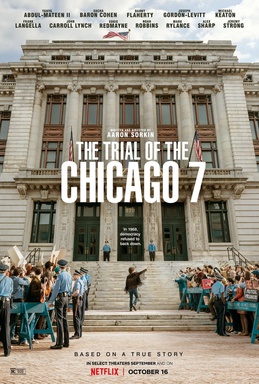The case at hand in this riveting film was one of great national concern. It is the year 1969 and the United States is knee-deep in an unpopular Vietnam War. Frustrated by the senseless loss of both American and Vietnamese lives, groups of anti-war citizens decide to stage a peaceful protest in view of the 1968 Democratic National Convention. But when the protest unintentionally erupts into a riot, the newly elected Nixon government decide to make an example out of a select seven men to quell rising dissent. A criminal case is charged against them, seeking to prove that they initiated a plan to incite violence against the police. But as one of the defendants quickly declares, "this is a political trial."
That statement is made by Abbie Hoffman, a leader of the counterculture Youth International Party (Yippies). Mischevious yet principled, he believes widespread cultural revolution is needed to foster progress. In the film's greatest casting coup, Sacha Baron Cohen is at his chameleonic best in the role, which acts as an extension of the subversively political comedy of his own productions like "Borat" and TV's "Who Is America". But the film also finds its bleeding heart through his dramatic scenes, anchoring the film through its most liberal viewpoint.
As Hoffman and his fellow defendants face off against a determined prosecution and a brazenly unsympathetic judge, Sorkin's screenplay works its magic through the sheer spectacle of the courtroom proceedings. Through testimonies and circumstantial evidence, it becomes clear that the accusations of a conspiracy are baseless, most obvious in the case of Bobby Seale (fiercely portrayed by Yahya Abdul-Mateen II), who is charged along with the Chicago 7 without any reasonable evidence of collusion.
Like the others, however, Seale's progressive ideologies pose a threat to the establishment. And Sorkin's script puts forth its most astute observations by parsing through such nuances within a larger progressive movement. The confrontations between Hoffman and Tom Hayden (a steady, confident Eddie Redmayne) are especially intriguing, as they explore the tensions between achieving progress through traditional, "respectable" means, versus disrupting the status quo by overturning a failing system and rebuilding anew.
Through this subplot, "The Trial of the Chicago 7" becomes a fascinating companion piece for Regina King's similarly philosophical "One Night in Miami". Both set during the tumultuous 1960s era of American society, they are resonant testaments to the ways in which long-standing injustices continue to divide us today. "The Trial of the Chicago 7" would have already been a must-see film for its captivating ensemble, engaging pacing and rousing story. But its sincere plea for a more free and fair democracy makes it all the more essential in a pivotal election year for the United States.
| Tweet |









